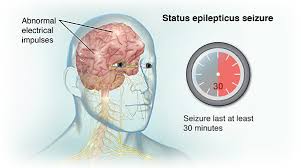Study Finds Three Anti-Seizure Drugs Similarly Effective for Severe Form of Epilepsy Known As Status Epilepticus
Source: Thailand Medical News Nov 29, 2019 5 years, 4 months, 3 weeks, 6 days, 19 hours, 4 minutes ago
A recent study by Michigan Medicine finds that the three most common treatment options administered in the emergency department for patients who experience refractory
status epilepticus are equally safe and effective.
Typically,
Status Epilepticus is characterized by individual seizures or multiple seizures close together lasting more than five minutes with a loss of consciousness. If not treated, it can lead to severe brain damage or death.

Often, benzodiazepines, a class of sedating medications that target the central nervous system, are the first line of treatment for status epilepticus and are effective in two-thirds of patients. Refractory
status epilepticus occurs in those patients in whom benzodiazepines don’t stop their seizures.
Dr Robert Silbergleit, M.D., a professor of emergency medicine at Michigan Medicine told
Thailand Medical News, “Optimizing emergency treatment with benzodiazepines has previously proven to reduce intensive care unit stays, hospitalization and other complications, but we have not had clinical trial data to tell us what works in those patients who continue to seize despite benzodiazepines. Although levetiracetam, fosphenytoin and valproate are three of the most commonly used intravenous drugs to treat refractory
status epilepticus in both children and adults, before this study, we didn’t know if one of these drugs worked better, or if any of them worked well at all.”
Dr Silbergleit is the senior author of the new study, published in the
New England Journal of Medicine, which reveals the three drugs are equally safe and effective in treating patients with refractory status epilepticus. The study was supported by the National Institute of Neurological Disorders and Stroke (NINDS), part of the National Institutes of Health.
Dr Robin Conwit, M.D., NINDS program director and an author of the study further commented, “Doctors can be confident that the particular treatment they choose for their patients with
status epilepticus is safe and effective and may help them avoid the need to intubate the patient as well as stays in the intensive care unit. This was a truly collaborative, multidisciplinary study that involved pediatricians, emergency medicine doctors, neurologists, pharmacologists and biostatisticians all contributing their expertise.”
For the ‘Established Status Epilepticus Treatment Trial’ (ESETT), more than 380 children and adults were randomized to receive levetiracetam, fosphenytoin or valproate when they came to the emergency department experiencing prolonged seizures.
Dr Silbergleit, along with lead co-authors Jordan Elm, Ph.D., a professor at Medical University of South Carolina, James Chamberlain, M.D., a professor at George Washington University and Jaideep Kapur, M.B., B.S., Ph.D., a professor at the University of Virginia, hoped to determine which of the anticonvulsant drugs was most effective in stopping seizures and improving a patient’s level of responsiveness within 60 minutes of administering treatment.
The clinical trial results showed that the three drugs stopped seizures and improved responsiveness in approximat
ely half of the study participants. Specifically, these benefits were seen in 47% of subjects in the levetiracetam group, in 45% of participants in the fosphenytoin group and in 46% of subjects in the valproate group. These differences weren’t statistically significant and there were no differences in serious side effects among the drugs.
Dr Robert Silbergleit added,“Our study suggests that clinical outcomes are driven by factors other than drugs. Differences in how doctors decide to treat
status epilepticus, such as when they give more drugs or when to anesthetize patients and put them on a mechanical ventilator, may be more important than the specific treatments used to control seizures in patients.”
The clinical study was stopped early when a planned interim analysis found that the drugs were equally safe and effective.
The ESETT researchers utilized a clinical trial design known as response adaptive randomization to improve the study’s efficiency and maximize the chances of identifying the best treatment. The study used an algorithm to determine which drugs patients would receive based on accumulating trial data.
Dr Jaideep Kapur, coauthor commented, “Using an innovative design for this clinical trial, we were able to answer this important question in a timely and cost-effective manner.In addition, this design lowered risk by reducing the chances that participants could have received what might have been determined to be the least effective treatment.”
Dr Silbergleit notes that the results of ESETT validate the use of the three drugs and give emergency physicians options when it comes to treating patients with refractory
status epilepticus.
Dr Silbergleit concluded, “Of the three
medications tested, only fosphenytoin is labeled by the Food and Drug Administration as a treatment for status epilepticus, and it is only approved for status epilepticus in adult patients. Our results demonstrate that doctors can choose a treatment based on availability, as shortages of these drugs have been common in recent years, cost, ease of administration or other practical criteria.”
Additional research is needed to prevent refractory
status epilepticus and to find treatment options for the patients whose seizures don’t respond to the three drugs investigated in this study.
The research team is initiating these studies for early 2020.
Reference: Kapur et al. “Randomized Trial of Three Anticonvulsant Medications for Status Epilepticus,” New England Journal of Medicine. DOI: 10.1056/NEJMoa1905795.
